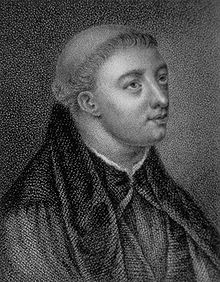John Lydgate
Appearance

John Lydgate (c. 1370–c. 1451) was an English poet and translator. He is considered one of the leading English poets of the 15th century, and in his own day was often ranked alongside his master, Geoffrey Chaucer.
Quotes
[edit]- A wikked tonge wol alway deme amis.
- "Ballad of Good Counsel", line 7.
- Who lesethe his fredam, in faith! he loseth all.
- "The Chorle and the Birde", line 95.
- A prowde hert in a beggers brest,
A fowle visage with gay temples of atyre,
Horrible othes with an holy prist,
A justice of juges to selle and lete to hyre,
A knave to comande and have an empire,
To yeve a jugement of that never was wrought,
To preche of pees and sette eche man on fyre,
It may wele ryme but it accordith nought.- "On Inconstancy", line 36.
- Woord is but wynd; leff woord and tak the dede.
- Secrets of Old Philosophers, line 1224.
- For love is mor than gold or gret richesse;
Gold faileth ofte; love wol abyde.- The Siege of Thebes, pt. 3, line 2716.
- For he owre englishe gilte with his sawes,
Rude and boistous firste be olde dawes,
That was ful fer from al perfeccioun
And but of litel reputacioun
Til that he cam, and thorugh his poetrie,
Gan oure tonge firste to magnifie
And adourne it with his eloquence:
To whom honour, laude and reuerence.- The Troy Book, Bk. 3, line 4237.
- Of Chaucer.
- Odyous of olde been comparisonis.
- "The Hors, the Shepe, and the Gosse", line 204.
- Harde to likke hony out of a marbil stoon,
For ther is nouthir licour nor moisture.- "Letter to Gloucester", line 34.
- Trouthe wil out maugre of fals enuye,
Rihtwysnesse may nat ben hid certeyn,
As for a tyme it may been ovirleyn.- The Life of Saint Alban and Saint Amphibal, line 2913.
The Fall of Princes
[edit]- For a story which is nat pleynli told,
But constreynyd undir woordes fewe
For lak off trouthe, wher thei be newe or olde,
Men bi report kan nat the mater shewe.- Prologue, line 92.
- Off oure language he was the lodesterre.
- Prologue, line 252.
- Of Chaucer.
- There is no rose
Spryngyng in gardeyns, but ther be sum thorn.- Bk. 1, line 57.
- For princis ofte, of furious hastynesse,
Wil cachche a quarrel, causeless in sentence,
Ageyn folk absent, thouh ther be non offence.- Bk. 3, line 3927.
- He as a kyng is crowned in Fairie,
With sceptre and suerd, & with his regalie
Shal resorte as lord and souereyne,
Out of Fairye & regne in Breteyne,
And repaire ageyn the Rounde Table.- Bk. 8, line 3112.
- Of the return of King Arthur.
- The wheel of Fortune tourneth as a ball;
Sodeyn clymbyng axeth a sodeyn fall.- Bk. 9, line 1211.
Misattributed
[edit]- For hit ys oft seyde by hem that yet lyues
He must nedys go that the deuell dryues.- The Assembly of Gods; or, The Accord of Reason and Sensuality, line 20.
- This poem was long attributed to Lydgate, but is now thought to have been written after his death, during the second half of the 15th century. [1]
Criticism
[edit]- Also Johnn Lydgate
Wryteth after an hyer rate;
It is dyffuse to fynde
The sentence of his mynde,
Yet wryteth he in his kynd,
No man that can amend
Those maters that he hath pende;
Yet some men fynde a faute,
And say he wryteth too haute.- John Skelton "Phillip Sparrowe", line 804.
- Comparable with Chawcer, yet more occupyed in supersticious and odde matters than was requesite in so good a wytte.
- William Webbe A Discourse of Englishe Poetry ([1586] 1970) p. 32.
- In images of horror, and in a certain terrible greatness, our author comes far behind Chaucer. Whether they were not suited to the genius or the temper of Lydgate, I do not determine; but it is certain that, though they naturally seemed to present themselves, he has almost generally chose to avoid them: yet is there frequently a stiller kind of majesty both in his thought and expression, which makes one of his principal beauties.
- Thomas Gray "Some Remarks on the Poems of Lydgate", in The Works of Thomas Gray (1858) vol. 5, pp. 308-9.
- He is the first of our writers whose style is cloathed with that perspicuity, in which the English phraseology appears at this day to an English reader…Whether his subject be the life of a hermit or a hero, of saint Austin or Guy earl of Warwick, ludicrous or legendary, religious or romantic, a history or an allegory, he writes with facility.
- Thomas Warton The History of English Poetry (1774-81) vol. 2, pp. 52-3.
- A voluminous, prosaick, and drivelling Monk.
- Joseph Ritson Bibliographia Poetica (1802) p. 87.

